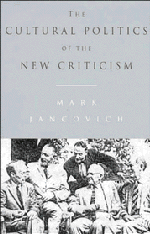Book contents
- Frontmatter
- Contents
- Preface
- List of abbreviations
- Part I The New Criticism and its critics
- Part II The formation of the New Criticism
- Part III The establishment of the New Criticism
- Part IV The development of the New Criticism
- Introduction
- 10 John Crowe Ransom: the isolation of aesthetic activity
- 11 Allen Tate: the man of letters and the cold war
- 12 Robert Penn Warren: literature and social engagement
- Conclusion: Modernism and postmodernism within the American academy
- Conclusion
- Notes
- Bibliography
- Index
11 - Allen Tate: the man of letters and the cold war
Published online by Cambridge University Press: 18 December 2009
- Frontmatter
- Contents
- Preface
- List of abbreviations
- Part I The New Criticism and its critics
- Part II The formation of the New Criticism
- Part III The establishment of the New Criticism
- Part IV The development of the New Criticism
- Introduction
- 10 John Crowe Ransom: the isolation of aesthetic activity
- 11 Allen Tate: the man of letters and the cold war
- 12 Robert Penn Warren: literature and social engagement
- Conclusion: Modernism and postmodernism within the American academy
- Conclusion
- Notes
- Bibliography
- Index
Summary
Introduction
Whereas American capitalism had seemed a virtually moribund system prior to 1941, the Second World War sponsored a period of economic growth and prosperity which created a widespread optimism about the American capitalist system. This situation led many American intellectuals who had previously opposed this system to identify with it. This identification was also influenced by another effect of the war: the development of America as a world power. With the end of the war, America had given up isolationism and had come to define itself as a world leader, but at the same time, it began to perceive the Soviet Union, and the spread of communism in Eastern Europe and Eastern Asia, as a potential threat to that position. In this context, many intellectuals became involved in anti-communist activities, such as involvement in the Congress of Cultural Freedom. Many came to identify American society itself with the cause of ‘free culture’. This situation limited the appeal of Tate's objections to modern society, and it was mainly his critique of communism which was influential during this period. None the less, while he became involved with the Congress of Cultural Freedom, his position was fundamentally different to that dominant among American intellectuals. He could not bring himself to identify with the American system itself, as Ransom had done by 1945, and this made his position in relation to the Congress highly problematic. Tate's politics was still defiantly reactionary, but for precisely this reason, he refused to abandon his critique of modern society and capitalism, and his claim that literature was a critical activity.
- Type
- Chapter
- Information
- The Cultural Politics of the New Criticism , pp. 114 - 123Publisher: Cambridge University PressPrint publication year: 1993



